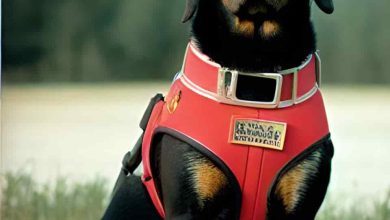Are Shar Pie Dogs Friendly
Introduction
When it comes to choosing a furry companion, one of the essential factors to consider is their friendliness. Shar-Pei dogs, with their distinctive wrinkled appearance, often raise questions about their temperament. In this article, we will explore the friendly nature of Shar-Pei dogs, understanding their behavior, and the factors that contribute to their overall friendliness.
What is a Shar-Pei Dog?
Originating from China, Shar-Pei dogs are a unique breed known for their loose skin, wrinkles, and sturdy build. Historically, they were bred for various purposes, including hunting, herding, and guarding. Today, Shar-Pei dogs have become beloved family pets worldwide.
The Temperament of Shar-Pei Dogs
Shar-Pei dogs are known for their loyal, independent, and sometimes stubborn nature. Their temperament can vary from one dog to another, influenced by genetics, upbringing, socialization, and training. While some Shar-Pei dogs may display reserved or aloof behaviors, others can be quite affectionate and outgoing.
Factors Affecting Friendliness
Several factors contribute to the friendliness of Shar-Pei dogs. Genetics play a crucial role, as some bloodlines may have a predisposition for a more reserved temperament. Additionally, early socialization and positive experiences during puppyhood can significantly shape their behavior and make them more friendly and well-adjusted.
Socialization and Training
Proper socialization and training are essential for developing a friendly Shar-Pei dog. Early exposure to various people, animals, environments, and stimuli helps them become comfortable and confident in different situations. Positive reinforcement-based training methods can also foster trust and strengthen the bond between the dog and their owner.
Shar-Pei Dogs and Children
Shar-Pei dogs can coexist harmoniously with children when introduced and socialized correctly. However, it’s crucial to supervise interactions between young children and dogs, as Shar-Pei dogs have a more sensitive nature and may not appreciate rough handling or excessive noise. Teaching children how to respect the dog’s boundaries and providing a safe environment is paramount.
Interaction of Shar Pie with Other Pets
The friendliness of Shar-Pei dogs toward other pets largely depends on their upbringing and early socialization. When introduced to other animals in a controlled and positive manner, Shar-Pei dogs can learn to get along with them. However, it’s important to monitor their interactions and ensure everyone’s safety.
Recognizing Signs of Aggression in Shar Pie Dogs
Like any dog breed, Shar-Pei dogs can display signs of aggression if they feel threatened or uncomfortable. It’s essential for dog owners to be familiar with these signs, which may include growling, snarling, raised hackles, stiff body posture, and avoiding eye contact. Recognizing these signs can help prevent potential conflicts and ensure a safe environment for everyone.
Tips for Encouraging Friendliness in Shar Pei
To encourage friendliness in Shar-Pei dogs, here are some valuable tips to consider:
- Start Early: Begin socializing your Shar-Pei puppy as soon as possible. Expose them to a variety of people, animals, and environments to build their confidence and adaptability.
- Positive Reinforcement: Use positive reinforcement techniques such as treats, praise, and rewards to reinforce friendly behavior. This approach helps them associate positive experiences with being friendly.
- Consistent Training: Establish consistent training routines to teach basic commands and manners. This helps Shar-Pei dogs understand boundaries and proper behavior, contributing to their overall friendliness.
- Gradual Exposure: Introduce your Shar-Pei dog to new experiences gradually. Avoid overwhelming them with too many stimuli at once. Gradual exposure helps them feel comfortable and reduces anxiety.
- Supervise Playtime: Monitor interactions between your Shar-Pei dog and other animals or children during playtime. Intervene if necessary to prevent any potential conflicts and ensure everyone’s safety.
- Provide Mental Stimulation: Keep your Shar-Pei dog mentally stimulated with interactive toys, puzzles, and training activities. Mental engagement can help prevent boredom and promote friendly behavior.
- Be a Role Model: Dogs often learn by observing their owners. Be a positive role model by displaying friendly behavior and interactions with others. Your Shar-Pei dog will likely mirror your actions.
- Maintain a Calm Environment: Shar-Pei dogs thrive in a calm and stable environment. Minimize loud noises, chaotic surroundings, and stressful situations, as these can impact their overall friendliness.
- Regular Exercise: Engage your Shar-Pei dog in regular exercise to release energy and prevent restlessness. Physical activity promotes a balanced temperament and can contribute to their friendliness.
- Professional Help: If you’re facing challenges with your Shar-Pei dog’s behavior or friendliness, consider consulting a professional dog trainer or behaviorist. They can provide guidance tailored to your dog’s specific needs.
Are Shar-Pei Dogs Suitable for Everyone?
While Shar-Pei dogs can make wonderful companions, they may not be suitable for everyone. Their independent nature and potential stubbornness require a dedicated and experienced owner who can provide consistent training, socialization, and mental stimulation. Additionally, families with young children should carefully consider the dog’s temperament and supervise interactions to ensure a safe environment for everyone involved.
See also: Are Chinese Shar-Pei Aggressive?
Common Misconceptions
There are some common misconceptions about Shar-Pei dogs’ friendliness that need clarification. Despite their unique appearance, not all Shar-Pei dogs are aggressive or unfriendly. With proper upbringing and socialization, they can be friendly and loving companions. It’s essential to judge individuals based on their behavior and temperament rather than making assumptions solely based on their breed.
Health Concerns
When considering adding a Shar-Pei dog to your family, it’s important to be aware of potential health concerns associated with the breed. Shar-Pei dogs can be prone to certain genetic conditions, including skin problems, eye issues, and hip dysplasia. Regular veterinary care, a balanced diet, and maintaining a clean and dry skin fold area can help mitigate these health concerns.
Conclusion
In conclusion, Shar-Pei dogs can be friendly and affectionate pets when given the proper care, socialization, and training. Their temperament can vary from dog to dog, but with early socialization, positive reinforcement, and a loving environment, Shar-Pei dogs can thrive as friendly companions. Remember, understanding their individual needs, recognizing signs of aggression, and providing appropriate guidance are key to fostering a friendly and well-adjusted Shar-Pei dog.
FAQs about the Shar Pei Dogs
1. Are Shar-Pei dogs good with children?
Shar-Pei dogs can be good with children when properly socialized and supervised. However, due to their sensitive nature, it’s important to teach children how to interact respectfully with the dog and avoid rough play. Always supervise their interactions to ensure the safety of both the child and the dog.
2. Do Shar-Pei dogs get along with other pets?
Shar-Pei dogs can get along with other pets, including dogs and cats, with proper socialization and introductions. Early exposure and positive experiences with other animals can help them develop friendly relationships. However, it’s crucial to monitor their interactions and provide a safe environment to prevent any potential conflicts.
3. Are Shar-Pei dogs aggressive?
Shar-Pei dogs, like any breed, can display aggressive behavior if they feel threatened or uncomfortable. It’s important to note that aggression is not inherent to the breed but can be influenced by various factors, including genetics, socialization, and training. Proper socialization, training, and understanding their individual needs can help prevent aggression.
4. How much exercise do Shar-Pei dogs need?
Shar-Pei dogs have moderate exercise needs. Daily walks, play sessions, and mental stimulation are important to keep them physically and mentally healthy. However, excessive exercise, especially in hot weather, should be avoided due to their susceptibility to overheating. Consult with your veterinarian to determine an exercise routine suitable for your Shar-Pei dog.
5. Can I train a Shar-Pei dog to be friendly if they have a reserved temperament?
Yes, it is possible to train a Shar-Pei dog with a reserved temperament to be friendly. Patience, consistency, positive reinforcement, and early socialization are key. By exposing them to new experiences, rewarding friendly behavior, and building their confidence, you can help them develop into more outgoing and friendly individuals.




